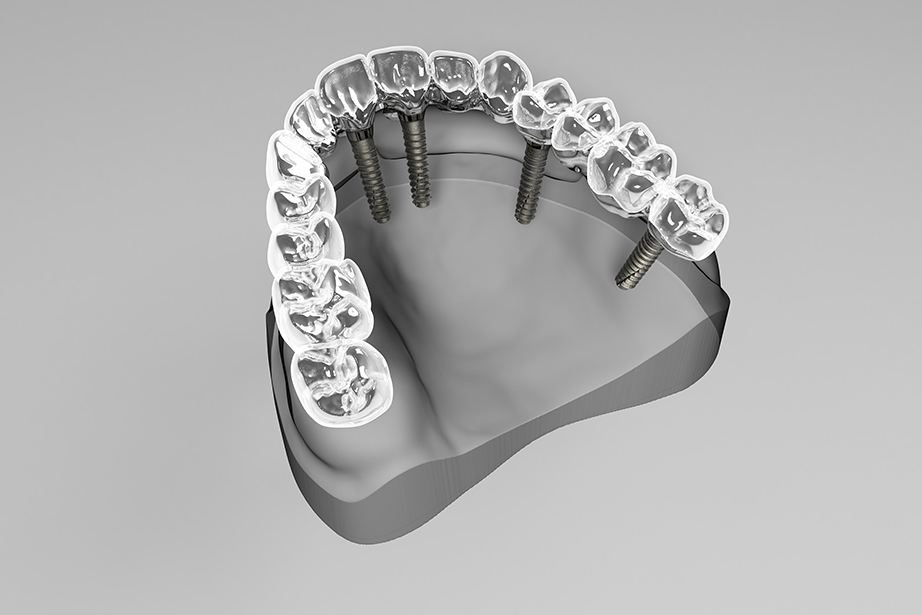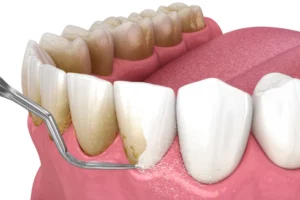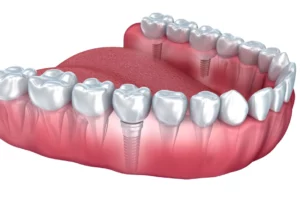One of the most common concerns for patients considering dental implants is the potential for pain during and after the procedure. This is an entirely valid concern. After all, the idea of drilling into one’s jawbone might seem a tad daunting. If you’re contemplating getting dental implants and wondering about the pain factor, Smile Boutique Group is here to provide clarity.
What are dental implants?
Before delving into the pain aspect, let’s briefly understand what dental implants are. Dental implants are titanium posts surgically placed into the jawbone to replace missing tooth roots. These implants provide a sturdy foundation for replacement teeth that can be made to match your natural teeth.
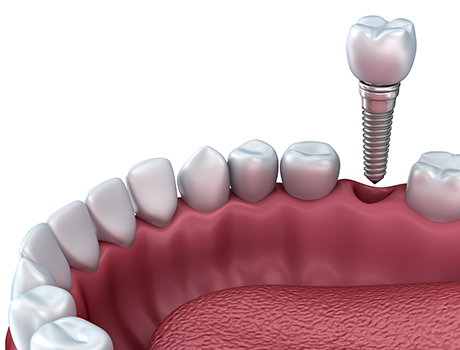
What are dental implants?
The thought of surgery in the mouth can naturally induce anxiety. However, the actual dental implant procedure is typically carried out under local anesthesia, ensuring that the patient doesn’t feel pain during the operation.
Most patients equate the sensation to that of having a tooth extraction. You’ll feel pressure and movement, but direct pain is significantly minimized by the anesthesia. If the idea of the procedure induces anxiety, many dental clinics, including Smile Boutique Group, offer sedation dentistry to help keep patients calm and relaxed.
Post-Surgical Pain: What to Expect
After the anesthesia wears off, some level of discomfort is to be expected, as with any surgical procedure. But it’s essential to differentiate between discomfort and unbearable pain.
Duration
Typically, the majority of discomfort and swelling after getting dental implants lasts for a few days. With proper care, many patients find they can resume their regular activities within a day or two.
Intensity
The pain is often described as a dull ache rather than sharp pain and is usually manageable with over-the-counter pain relievers. Most patients find they don’t need stronger prescription pain medication.
Variability
Everyone’s pain threshold and healing process are different. Factors influencing post-surgical pain include the patient’s overall health, the number of implants placed, and the individual’s adherence to post-operative care instructions.
Managing Post-Surgical Pain
Over-the-counter pain relievers
Non-prescription painkillers like ibuprofen or acetaminophen can be effective. Always consult with your dentist or oral surgeon about the best dosage and any potential interactions.
Cold compress
Applying a cold pack to the affected area can help reduce swelling and numb the pain. Make sure to wrap the cold pack in a thin cloth or towel to avoid direct contact with the skin.
Saltwater rinses
While you should avoid vigorous rinsing or spitting in the first 24 hours after surgery, gentle saltwater rinses can be beneficial in the days that follow. They help in reducing inflammation and keeping the area clean.
Adhere to dietary recommendations
After getting implants, it’s best to stick to soft foods for several days to avoid any undue pressure or irritation in the implant area. Foods like yogurt, mashed potatoes, and soups can be soothing and promote healing.
Oral hygiene
Keeping your mouth clean is crucial for preventing infection and ensuring a smooth recovery. However, be gentle around the implant site to avoid irritating it.
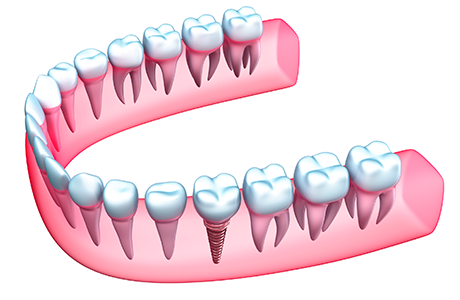
Long-term Comfort and Success of Dental Implants
Once the implant area has healed, which can take several months, the dental implant should feel like one of your natural teeth. If placed correctly and taken care of, they can last a lifetime.
Furthermore, with a success rate of over 95%, dental implants are one of the most reliable and successful restorative dental procedures available.
The Bigger Picture: The Value of Dental Implants
While the prospect of some post-surgical discomfort might be off-putting, it’s essential to consider the longer-term benefits of dental implants:
Improved Appearance
Dental implants look and feel like your natural teeth. They can restore your smile and confidence.
Enhanced Functionality
No more worrying about slipping dentures. With implants, you can eat, speak, and laugh without hesitation.
Preservation of Jawbone
Implants prevent the jawbone from deteriorating, which can occur when teeth are missing.
Overall Oral Health
Unlike tooth-supported bridges, dental implants don’t require reducing other teeth. This ensures more of your original teeth are left intact, improving long-term oral health.
Why choose Smile Boutique Group?
If you’re considering dental implants, it’s crucial to make your decision based on accurate information and a full understanding of the process. Reach out to Smile Boutique Group to discuss your options and address any concerns you might have. We’re dedicated to ensuring our patients have a comfortable and informed experience.
Ready to restore your smile with minimal discomfort? Schedule a consultation with Smile Boutique Group today and let us guide you every step of the way. Your radiant smile awaits!
Frequently asked questions(FAQs) for do dental implants hurt?
The procedure itself is typically carried out under local anesthesia, so you shouldn’t feel pain during the operation. Most patients compare the sensation to having a tooth extraction. There may be some discomfort or mild pain afterward, which can be managed with over-the-counter pain relievers.
While most patients can resume their regular activities in a day or two, the actual healing process can take several months as the jawbone integrates with the implant. This process, known as osseointegration, is crucial for the implant’s stability and success.
Dental implants boast a high success rate of over 95%. However, like any surgical procedure, there’s a small risk of complications. These can include infection, injury to surrounding structures, nerve damage, and implant failure. Choosing an experienced dental professional can significantly minimize these risks.
Post-operative care may include using cold compresses to manage swelling, sticking to soft foods, gentle saltwater rinses, and maintaining good oral hygiene while being gentle around the implant site.
Once placed and healed, dental implants are designed to look, feel, and function like your natural teeth. With proper care, many patients find it hard to differentiate between their natural teeth and the implant.
With proper care and oral hygiene, dental implants can last a lifetime. They are one of the most durable dental restoration options available.

